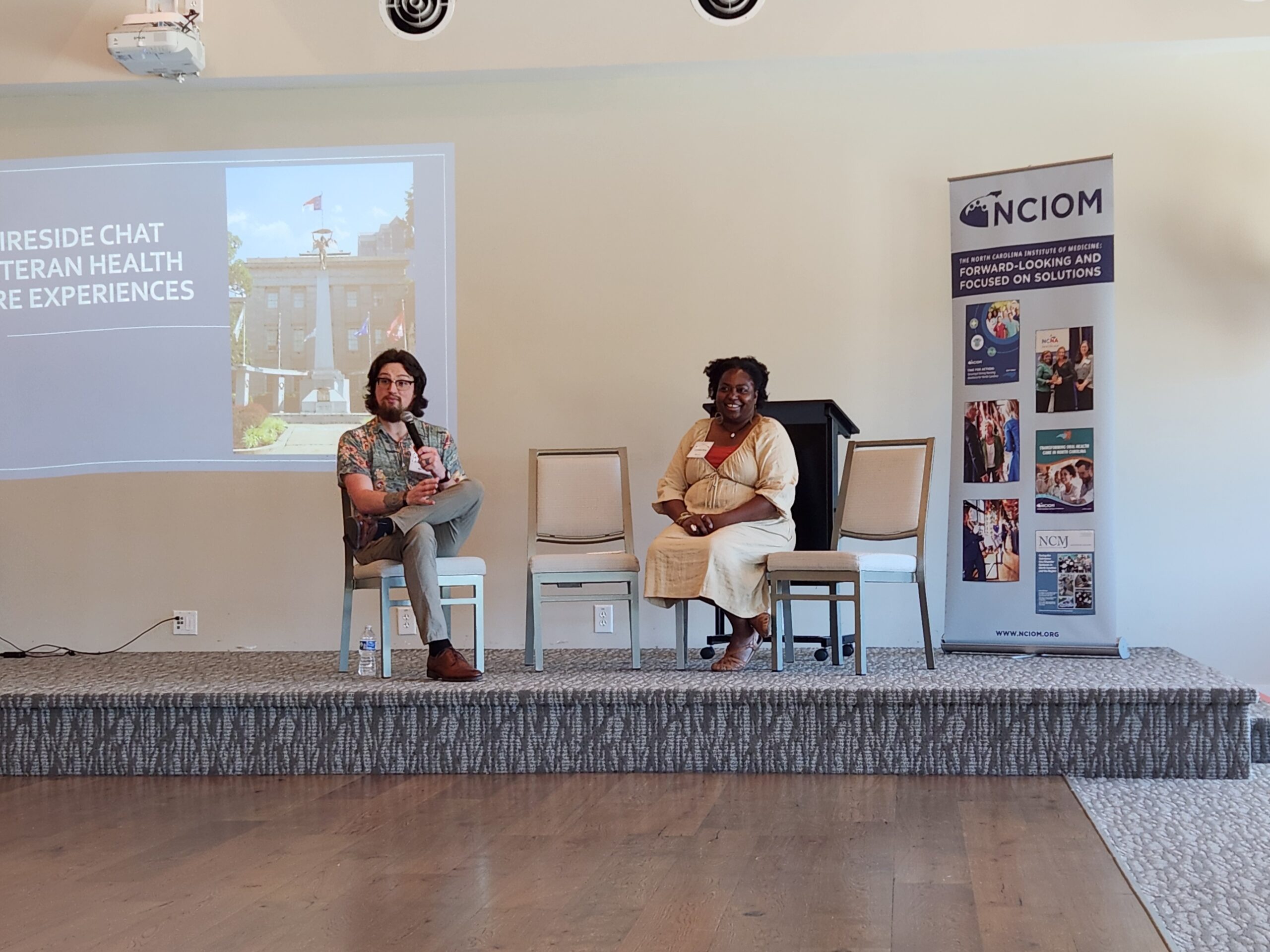

On May 22, 2025, the North Carolina Institute of Medicine (NCIOM) convened a diverse group of stakeholders for the official launch of its Task Force on Veterans’ Health. Held at the American Legion Post No. 6 in Chapel Hill, the event brought together leaders from state agencies, health care systems, academic institutions, nonprofits, and the Veteran community. The afternoon was defined by stories, dialogue, and shared purpose, setting a resolute tone for the work ahead.
With more than 650,000 veterans living in North Carolina—many of them navigating complex systems of care—the need for a coordinated, strategic approach to Veterans’ health has never been greater. As NCIOM President and CEO Michelle Ries shared in her opening remarks, the goal of the task force is not only to identify challenges, but to produce actionable solutions that strengthen the health and well-being of veterans, their families, and caregivers across the state.
Over the past several months, NCIOM staff have engaged in a robust learning phase, conducting interviews, focus groups, and collaborative discussions with Veteran-serving organizations. At the task force launch, Project Director Brieanne Lyda-McDonald presented early findings from this effort, highlighting persistent barriers in access to care, cultural competence challenges among providers, and the need for improved transitions from military to civilian life.
Veterans and their families are often unaware of available resources, and those who do seek care—whether through US Department of Veterans Affairs providers or community providers—frequently encounter fragmented systems and stigma, especially around mental health.
These findings helped frame the rest of the afternoon, which included a compelling fireside chat between Austyn Kobs, NCIOM project intern and graduate student at North Carolina State University (NCSU), and Lucretia King, program coordinator for Jeffrey Wright Military and Veteran Services at NCSU. King spoke candidly about her own experience transitioning from active duty to higher education and the challenges she faced in accessing care that truly understood her military background. Her insights, both personal and policy-relevant, underscored the importance of Veteran-led initiatives and culturally informed support systems.

The event also gave space for direct conversation among attendees. In two rounds of tabletop discussions, participants explored topics ranging from geographic barriers to care to community partnerships and the potential of technology and telehealth in closing access gaps. Participants were encouraged to jot down reflections, pose questions, and share ideas on a “Post-it wall” at the back of the room—an informal but meaningful way to contribute to the shaping of task force recommendations.
In the afternoon, the NCIOM hosted a panel discussion featuring leaders from across the state working on the front lines of Veteran services. Panelists included Jennifer Freeman of the North Carolina Department of Military and Veteran Affairs, Shannon Pointer from the Association for Home & Hospice Care of North Carolina, and Brandon Wilson of Veteran Services of the Carolinas. Each offered real-world examples of how their organizations are innovating to serve veterans, whether through transitional housing programs, home-based care, or integrated service models that connect veterans to a constellation of local supports.
Attendees left not just with new information, but with new connections and a shared sense of momentum. As task force co-chairs Dr. Margaret Wilmoth, a retired Major General and professor at UNC, and Jocelyn Mitnaul Mallette, secretary of the North Carolina Department of Military and Veteran Affairs and US Air Force Veteran, both reminded the audience in their closing remarks, this work is about more than policy. It’s about people. It’s about creating systems that honor the service and complexity of veterans’ lives by meeting them where they are.
Over the next 18 months, the Task Force on Veterans’ Health will meet regularly, gathering input, identifying gaps, and crafting recommendations designed to improve care coordination, empower community-level efforts, and amplify the voices of those who have served. Co-chaired by Secretary Mallette, Dr. Wilmoth, and Paul Berry (Veterans Bridge Home’s Triangle Network Senior Director and retired Sargeant Major, USMC), the task force is supported by a range of public and private funders committed to advancing health equity in North Carolina.
As the event closed and the room began to empty, the Post-it wall remained—colorful, covered in handwriting, and filled with ideas. It stood as a symbol of the day’s biggest takeaway: when you bring people to the table, listen deeply, and lead collaboratively, real change is possible.
_______________________________________________
Written by
Austyn Kobs
NCIOM Veterans' Health Task Force Intern
Retired from the US Air Force in 2023
_______________________________________________
NCIOM task forces and projects bring together stakeholders to identify evidence-based solutions to address health issues in North Carolina. For more information about the NCIOM's current task forces and projects, including the Task Force on Veterans’ Health, please visit our current task forces and projects page.